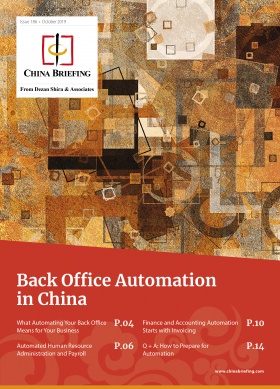China’s New Trademark Law in Effect from November 1
- China’s new Trademark Law (the fourth amendment), which was passed on April 23, came into effect November 1, 2019.
- Six articles of the law have been revised (Articles 6, 19, 33, 44, 63, and 68).
- The law has strengthened provisions tackling bad-faith trademark registrations and intensifies the punishment for trademark infringement.
China has been taking its market-based reforms seriously, with a particular emphasis on tightening its intellectual property rights protections.
The latest amendment to its trademark regime come down heavily on trademark squatters and those found guilty of trademark infringement – key grievances repeatedly cited by foreign brands in China and a point of contention in the US-China trade war.
In this article, we explain the major changes to the law and impact of the revisions for non-compliance.
Prohibiting bad-faith trademark filings
- Rejection of bad-faith filing at the application stage – Article 4
The most noteworthy change is a new provision added to Article 4 of the Trademark Law – “Malicious trademark registration without an intention to use should be rejected.”
Previously, due to China’s “first-to-file” system, a large number of trademark squatters maliciously registered well-known trademarks or hoarded trademarks for profiteering – one of the key grievances in intellectual property (IP) disputes repeatedly cited by foreign brand owners.
In order to eradicate the phenomenon at its source, the new amendment empowers the China Trademark Office (TMO) to deny bad-faith filings at the initial examination stage.
Article 4 is then set as a basis for changes in Article 33 and Article 44, which allow brand owners and other interested parties to challenge malicious trademark registrations in the opposition and invalidation contexts as well.
- Objection of bad-faith application during the announcement period – Article 33
Following the application, during the three-month announcement period after the initial review by TMO, anyone, not just the brand owner, can lodge an objection with the TMO if they believe there is a bad-faith application. The CTO has the right to reject the bad-faith application if the violation is verified.
- Cancellation of bad-faith registrations through invalidation proceedings – Article 44
The TMO may invalidate the registration of a maliciously registered trademark. Any other organization or individual may request the Trademark Review and Adjustment Board (TRAB) to declare the said trademark invalid if a violation was found.
Increased legal obligations for trademark agencies
- Compliance by trademark agency – Article 19, 68
Besides, the new law stipulates that a trademark agency cannot accept the commitment if it knows, or ought to know, that the trademark to be registered by such clients is in bad faith (Article 19). Trademark agencies that violate the provisions in Article 4 can face administrative penalties (Article 68).
Intensified punishment for trademark infringement
In the case of “malicious and serious” trademark infringement, the maximum amount of punitive damages has been increased from one to three times the relevant base amount to one to five times. Where it is impossible to calculate the base amount, the maximum amount of statutory damages is increased from RMB 3 million to RMB 5 million (approx. US$427,200 to US$712,000).
Further, the new Trademark Law grants remedies to eliminate the effects of the infringement.
Article 63 rules that apart from “special circumstances”, at the request of the trademark holder, goods bearing counterfeit trademarks and the tools and materials used for manufacturing such counterfeit goods can be destroyed upon judgement by the courts. In addition, commodities bearing counterfeit registered trademarks will still be banned from commercial channels after the counterfeit registered trademarks are removed.
There are, however, some uncertainties on the actual implementation of these revisions. For instance, the unclear definition of “without the intention to use”. Nevertheless, the changes are generally positive for both domestic and foreign brand owners and can help maintain a level playing field. Foreign investors are advised to stay abreast of the guideline issued by the court and seek local expertise to better protect their brands.
About Us
China Briefing is produced by Dezan Shira & Associates. The firm assists foreign investors throughout Asia from offices across the world, including in Dalian, Beijing, Shanghai, Guangzhou, Shenzhen, and Hong Kong. Readers may write to china@dezshira.com for more support on doing business in China.
- Previous Article Transit Visa Exemptions in China: 24-Hour, 72-Hour, and 144-Hour Options
- Next Article China’s 2020 Holiday Schedule







